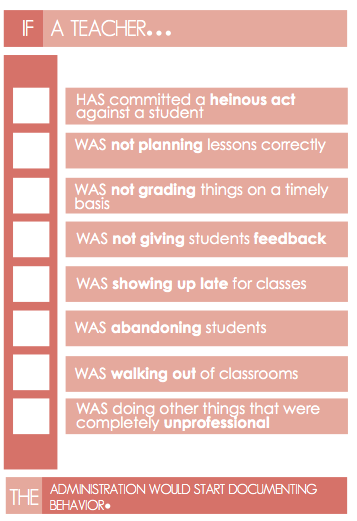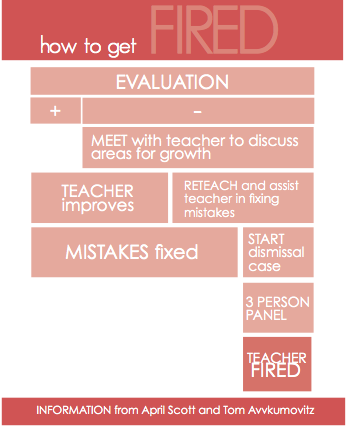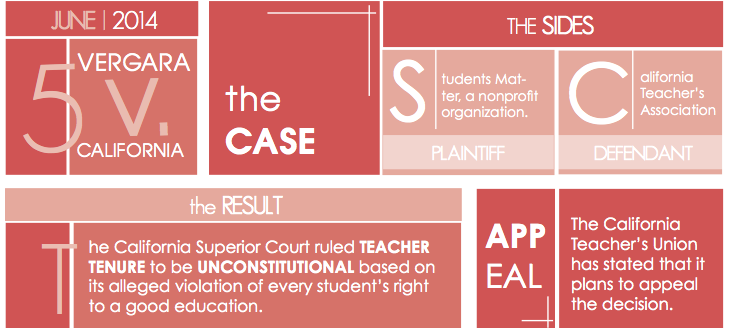backlash, also started to close his eyes. Angered by the audacity of the drowsy students, the teacher rang a bell next to the worst offenders, in an attempt to take back control of the classroom. As he shook his head in confusion, the tenured teacher reportedly started to yell at the class, impervious to consequences.
Situations like these have caused many to question teacher tenure, especially in the wake of the recent ruling of the Vergara vs. California case, which ruled the system of tenure unconstitutional.
What is teacher tenure?
In its technical definition, teacher tenure is a form of due process, put in place to prevent administrators from firing educators without proper cause.
“All it means, with permanent status, is that there is a process that needs to be followed before a teacher is let go,” co-site president of the Fremont Education Association of FUHSD Teachers, and history teacher, Bonnie Belshe said. “So it’s not just ‘we don’t like you, you’re gone.’”
Tenure became more prominent in the early 1900s, in an attempt to protect teachers whose positions were subject to the political, racial or personal biases of school administrators. In addition, it serves to shield educators who choose to teach topics that may be controversial with school administration.
“I don’t want to feel like I can’t teach a controversial topic because administration or whoever doesn’t agree with me, and that that would interfere with my job ability,” co-site president of the Fremont Education Association of FUHSD Teachers and science teacher Lora Lerner said. “I’m only going to be judged on what I should be judged, which is my teaching.”
School administrators view tenure in California as a commitment by the school to a teacher who has displayed scholastic excellence as a probationary educator.
“It’s a big decision for any school because once you become tenured, then you’re considered a permanent employee,” Principal April Scott said. “You really want to make sure that the people on that path are committed to education, care about kids, [want] to grow personally, and have the same belief system as your organization.”
Despite the change in name, however, teacher tenure does not guarantee  permanence.
permanence.
“The misconception about tenure is that once you’re a tenured teacher, you will always be a tenured teacher, and nobody can do anything to get rid of you,” Scott said. “That’s false. The hope is that tenured teachers, no matter how long they have tenure, are as devoted to education and to personal growth as they were when they first became tenured, that new teachers and veteran teachers have the same passion and commitment.”
Many view tenure as a many sided issue. This is likely due to the fickle nature of tenure, which protects academic freedom and questionable teachers alike.
“I want to be sure that what I do as as a teacher, assuming that I am an ethical person, that I’m not going to be attacked for voicing my opinion on something in a way that might be interpreted by someone as being threatening for whatever reason,” history teacher Margaret Platt said. “In that way, the decision is a precarious, slippery slope. On the other hand, I recognize that there’s a bunch of dead wood out there, teachers that aren’t doing their jobs, and they need to be gone.”
Vergara vs. California
The opponents of teacher tenure recently struck a significant blow against the system with their victory on June 10, when Judge Rolf Treu of the California Superior Court for the County of Los Angeles ruled teacher tenure in California to be unconstitutional. This controversial decision has experienced significant backlash from many teachers.
“[The judge] did not follow any, quite frankly, evidence to support that,” Belshe said. “It’s an issue within a district.”
Treu ruled tenure unconstitutional on the basis that the process was denying certain students the right to a high quality education, in particular those from low income areas where poor teachers can have a dramatic effect on the future success of their students.
The California Teacher’s Association plans to appeal the decision, as it would result in the loss of job protection for all teachers within the state. While teacher tenure is a polarizing issue, some have argued for compromise rather than continued litigation.
“Usually I’m not a compromiser, but I’d like to see something done where there’s compromise,” said Platt. “I think we need a process to be able to get rid of dead wood, but at the same time, maintain the positive aspects of tenure, protecting the teacher in the classroom, that academic freedom. I thinks that’s a balanced, reasonable solution.”
How the evaluation process works
Students often complain that tenure makes teachers lazy and promotes inefficient behavior. In a survey of 299 MVHS students, 86 percent of them believed that there was a correlation between incompetent teachers and the presence of teacher tenure.
“It promotes inefficient and subpar teachers,” said the anonymous senior. “We live in a more affluent area, so we don’t lack teachers. But here at Monta Vista, it promotes inefficiency. I had a teacher who was really mediocre, despite the high standards of our school district. A lot of our class thought that they should be replaced by a better teacher, but they had been teaching for a long time and had seniority.”
Teacher evaluations become less frequent if a teacher has taught for longer periods of time. Teachers who are on probationary standing are observed and evaluated twice a year, tenured teachers are evaluated every other year and teachers that have taught in the district for 10 years can be evaluated every five years.
“If unions want to maintain quality education, if they say they’re all about the kids, then they need to be willing to look closely at the concept of tenure, because tenure, we know, promotes, in some instances, lack of quality, from a teacher’s standpoint,” Platt said.
The process for removing a tenured teacher is long and complex, but has defined criteria that would merit evaluation of the teacher in question. While student input does not factor directly into the removal process of a teacher, it can initiate evaluation of their merits as an educator. Students have the ability to inform the administration about ineffective teachers, which can lead to administrative involvement despite set evaluation criteria.
“It’s always something that we consider, but in a vague way,” Scott said. “If I had students pounding down my door saying, ‘We’re concerned about all these things that are going on with teacher X’, the first thing that I would do is I would go to the teacher and say ‘We’ve got some concerns, and this is what I’m hearing from students. Let’s see what we can do to remedy that.’ While student input can’t impact their tenure, I wouldn’t want students to be silent.”
What comes next
Neither teachers nor administrators can imagine a future without tenure, as the loss of such an ingrained practice would require a complete overhaul of the education system and teacher assessment.
“It’s going to take a long time to implement anything [from the Vergara case],” said Tom Avvakumovitz, the Director of Human Resources for the district. “In the mean time though, instead of trying to focus on writing policy, at least in Human Resources, we’re trying to focus on hiring the best teachers we can.”
While the future is uncertain, if the decision stands, teachers will no longer be viewed as invulnerable.
“If it did come to the point where there would not be tenure, teachers [would] be just like everybody else,” Platt said. “They [would] have to perform on a daily basis, like in the real world.”
This story was reported on by Rahul Iyer and Maya Murthy





















